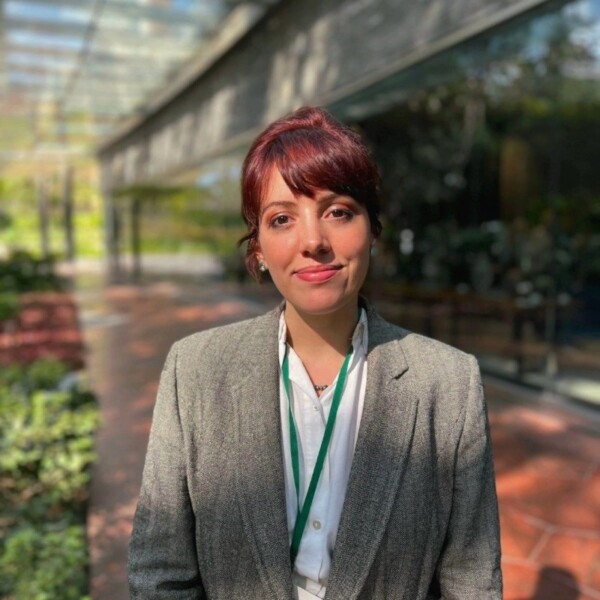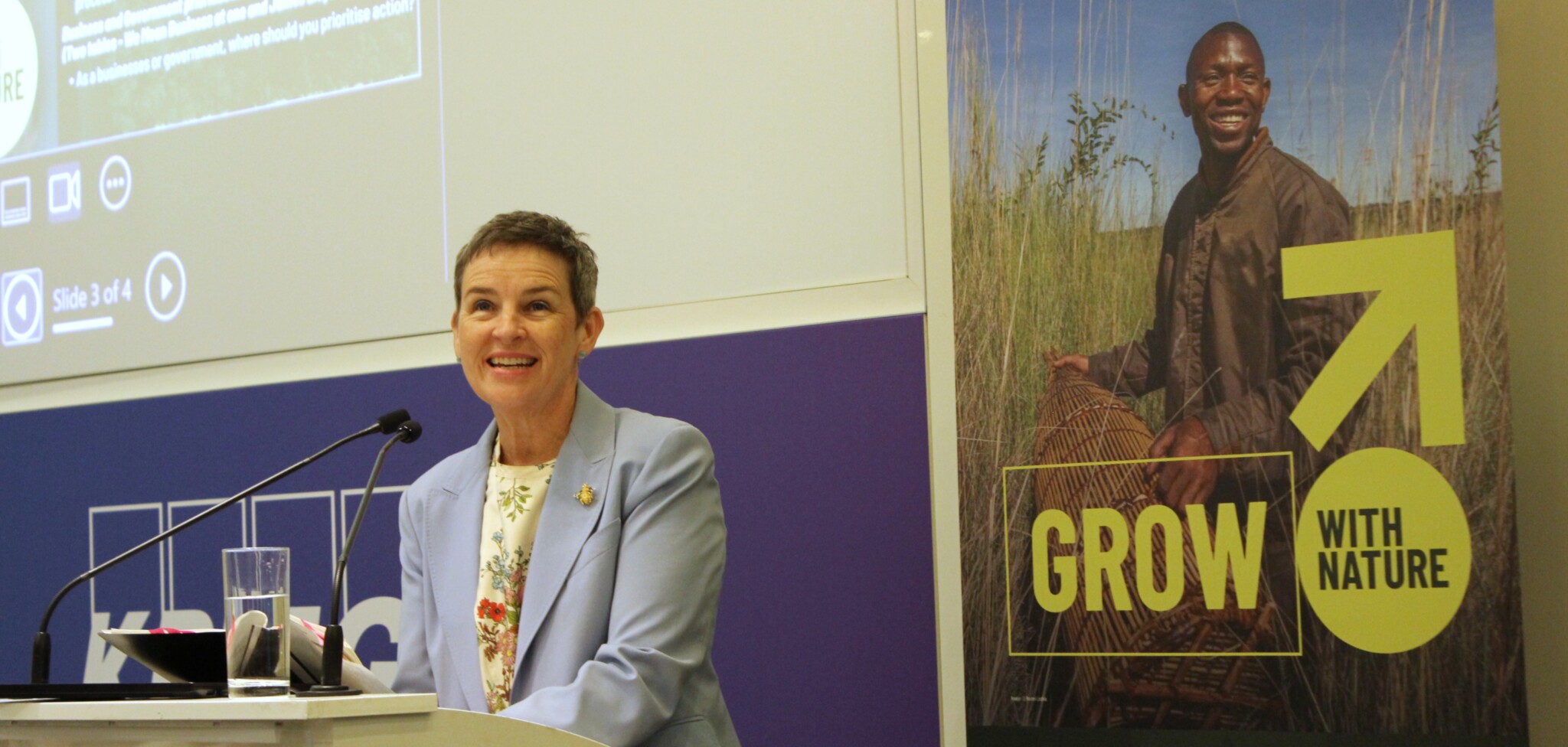
The Climate Innovation Forum at the Guildhall spotlighted the event 'Putting nature centre stage on the road to COP30.' Photo: Mariana Ceccon/Nature4Climate.
On the main stage of the Guildhall Great Hall, the UK’s Special Representative for Nature, Ruth Davis, opened with a declaration that set the tone for the week: “Nature is not only at the center of COP30. It is probably at the heart of London Climate Action Week for the first time.” Just a few steps away, Natalie Blyth, Global Head of Sustainable Finance and Transition at HSBC, closed her session echoing the sentiment: “Every session I go to this week is nature rising.”
Meanwhile, at Kew Gardens, Ana Toni, CEO of COP30, reflected on how this year’s LCAW felt different, and not just because London hit +30°C. “COPs are no longer two-week events,” she said. “They’re part of a continuous process. Climate weeks like London and New York are now critical milestones. They are pre-COPs in their own right.”
They weren’t wrong. Of the more than 700 events held during LCAW 2025, over 240 official sessions focused on nature-based solutions, the climate solution we can no longer afford to overlook. It was a marathon of urgency, spotlighting the nature finance gap and positioning nature as a key economic, social, and ecological opportunity.
Read more
Related articles for further reading
With barely a moment on the agenda untouched by nature, summarizing seven days of dialogue may seem overly ambitious. But some themes stood out. Panels explored how geopolitical tensions are reshaping sustainability strategies and investor priorities, the role of emerging technologies such as artificial intelligence, and the urgent need for adaptation (especially in the agriculture sector) and for restoring nature in urban spaces—a topic amplified by London’s sweltering heat.
Buzzwords such as catalytic capital, bioeconomy, and insurance mechanisms for de-risking climate action dominated the discourse. And for a good reason: scaling investment in nature requires more than financial innovation. It demands bold policy signals and cross-sector partnerships.
“The cost of capital is based on the perception of risk,” explained Jack Hurd, Executive Director of the Tropical Forest Alliance (TFA-WEF), speaking from the top floor of The Gherkin. “When risk is predictable, it can be priced. At that point, innovative finance becomes traditional finance. And traditional finance is the key to scale nature-based solutions.”
Brazil’s Minister of Environment and Climate Change, Marina Silva, spent the week also addressing the private sector with a similarly urgent provocation: “As we move closer to COP30, we need boldness to forge a new pact between climate and forests. One that helps create a new cycle of prosperity, with the courage and disruptive capacity to change before we are abruptly changed by the climate crisis.”
Assuming all risks, here’s our attempt at a synthesis of the conversations that shaped the week:
Backstage: Nature behind closed doors
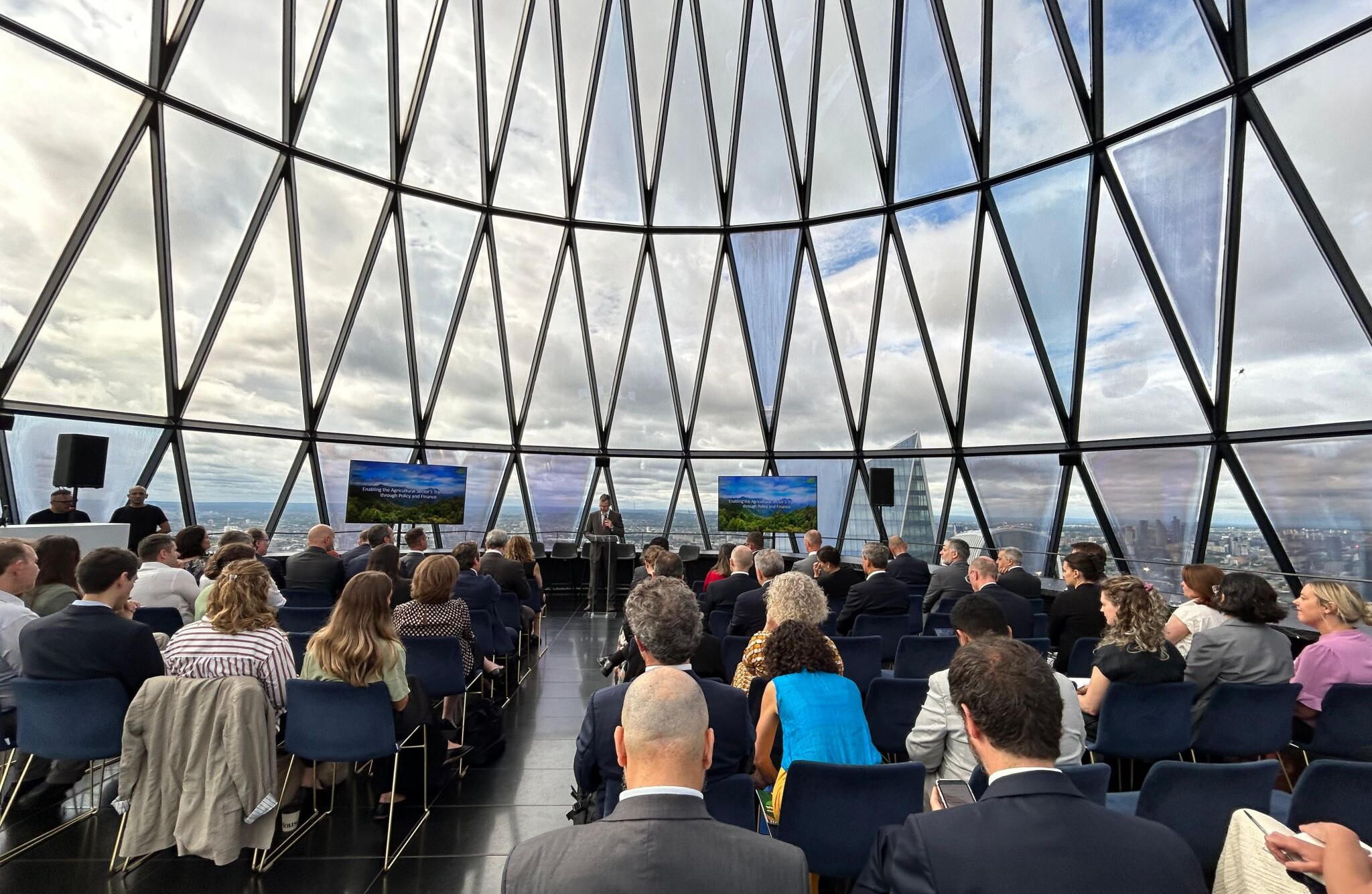
'Enabling the Agricultural Sector's Transition through Policy & Finance’ event hosted by TFA at the Gherkin. Photo: TFA
“The new kid on the block”
If you haven’t heard about the Tropical Forest Facility Forever (TFFF) yet, you were probably not in London last week. Set to be launched at COP30, the new mechanism to finance forest protection was brought to nearly every table at the conference.
In short, the TFFF addresses what the UN High-Level Climate Champion for COP30, Dan Ioschpe, has been calling a “fundamental market failure”: the fact that tropical forests are worth more dead than alive in most financial systems. It aims to create a new, scalable, transparent financing structure by mobilizing philanthropic, public, and private capital, then reinvesting these resources in a diversified investment portfolio.
TFFF revenues will reward countries per hectare of conserved forest while maintaining its capital base. It may sound complex, but the Brazilian delegation has been emphasizing that the key principles are fourfold: national sovereignty – so countries decide how to use the payments; simple and transparent monitoring – moving away from dollar-by-dollar reporting; and additionality – to ensure the TFFF complements existing funds, public budgets, and blended financial mechanisms, directing finance to Indigenous Peoples and Local Communities (IP&LC) without intermediaries.
“The beauty of the TFFF is creating a product that everyday investors can understand, analyze, and make a decision about,” said Tim McNeill, Head of Mobilizing Finance and REDD+ for the UK Foreign, Commonwealth and Development Office.
LCAW was the strongest trial round for the TFFF beyond the diplomatic route so far. Brazil’s challenge was to take the idea beyond negotiation rooms—engage investors, and present it as an initiative strongly backed by Global South countries, mainly Colombia, Indonesia, the Democratic Republic of Congo, and Ghana, along with key allies such as the UK and Norway.
“This could well become one of the most significant—if not the defining—outcomes of COP30 in Brazil.”
Carlos Alvarado Quesada, former President of Costa Rica.
At the high-level dinners, Brazilian delegates argued that we are approaching a time when “we don’t just need a new path; we need a new way of walking,” and the TFFF is all about creating a new cycle of prosperity. “Humanity has been working to convert nature into money; now we’re working to convert money into nature.” At the tables, the conversations also reflected the tone that the COP30 presidency is working to break down barriers. “Right now, when people think about climate change, they think only about energy transition. After COP30, we want people to think about nature too—and finance for nature.”
We could go on. But in the interest of making a long story short(er), here you can find a collection of quotes said by representatives of key countries and global organizations about the TFFF during the week.
The ‘Boom’ Story
In the last four years, private finance for nature has grown elevenfold and now exceeds 100 billion dollars. The growing momentum and support for closing the nature-badged finance gap is not going unnoticed. “If we’re not connected to land and nature, we’re not in business,” commented Ian Hudson, Anglo American’s Head of Nature and Ecosystems, during the opening of the week at the Nature Hub. UK Nature Minister Mary Creagh told 300 leaders in the hub that the narrative around nature-based solutions is quickly evolving, shifting from risk to opportunity: “Nature is not a cost, it is capital,” she said in her opening remarks. The boom story behind the Nature Hub walls is documented in this four-thematic discussion wrap-up.
“Nature agenda is moving from compliance to risk and opportunity with a stronger link to business value. Nature’s case is helped by the fact that it is local and interventions often have immediate results, which better aligns the incentives of companies and executives to take action.”
Sebastian Leape – CEO at Natcap
But the Nature Hub wasn’t the only place where the private sector showed up. At Lancaster House, the UK Government hosted a high-level international nature finance event attended by King Charles. Over 100 global leaders gathered to make financial commitments and showcase more than 40 real-world examples of integrating nature into business and investment decisions.
“Investing now so people and the natural world don’t pay the price later is not just the right thing for the planet—it’s smart economics,” said Tanya Steele, Chief Executive of WWF-UK, at the event. “It creates jobs, builds resilience, and reduces risks for governments, people, and businesses alike. But finance alone isn’t enough. Without strong policies and regulations, we risk funding solutions with one hand while driving destruction with the other.”
Mariana Grossi, Special Envoy for Business at COP30 and representative of CEBDS, also pointed out the COP30 new bottleneck: “Negotiation is no longer the challenge—implementation is.” She flagged fragmentation as a major obstacle, with too many initiatives and too little alignment. Her call was clear: simplify the climate finance landscape, align efforts, and co-create matchmaking platforms that connect real project needs with investor priorities.
More from the Week:
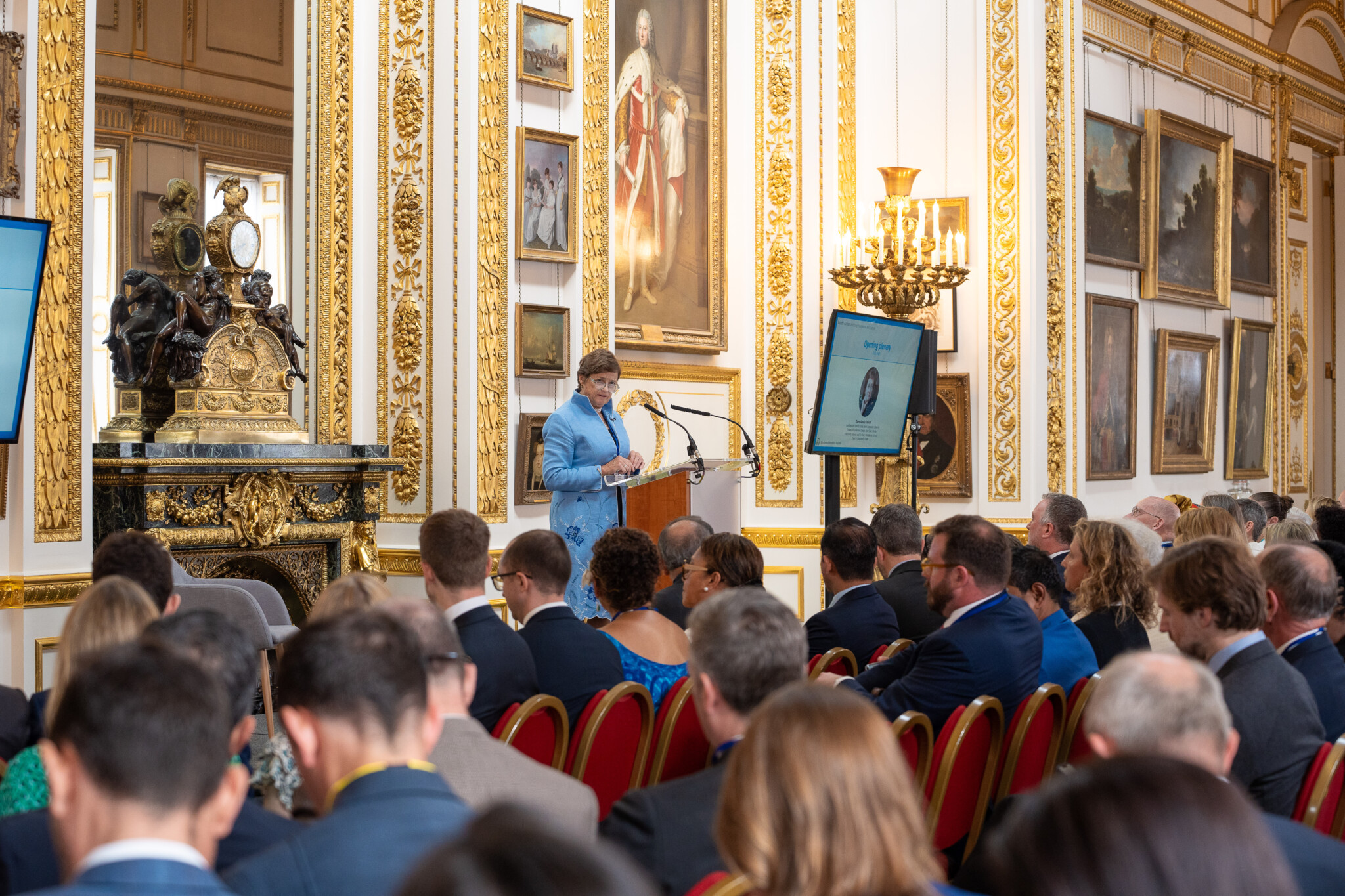
Among the announcements made at Lancaster House: a new partnership between Conservation International and Silvania to channel millions in private capital into nature-based solutions. The collaboration will leverage CI’s scientific expertise and community networks to guide Silvania’s investments and catalyze further funding. Also unveiled was the Nature Finance Innovation Lab, launched by Financial Sector Deepening Africa with UK Government support, to unlock private investment in locally developed, nature-first projects. Photo: DEFRA – UK Gov
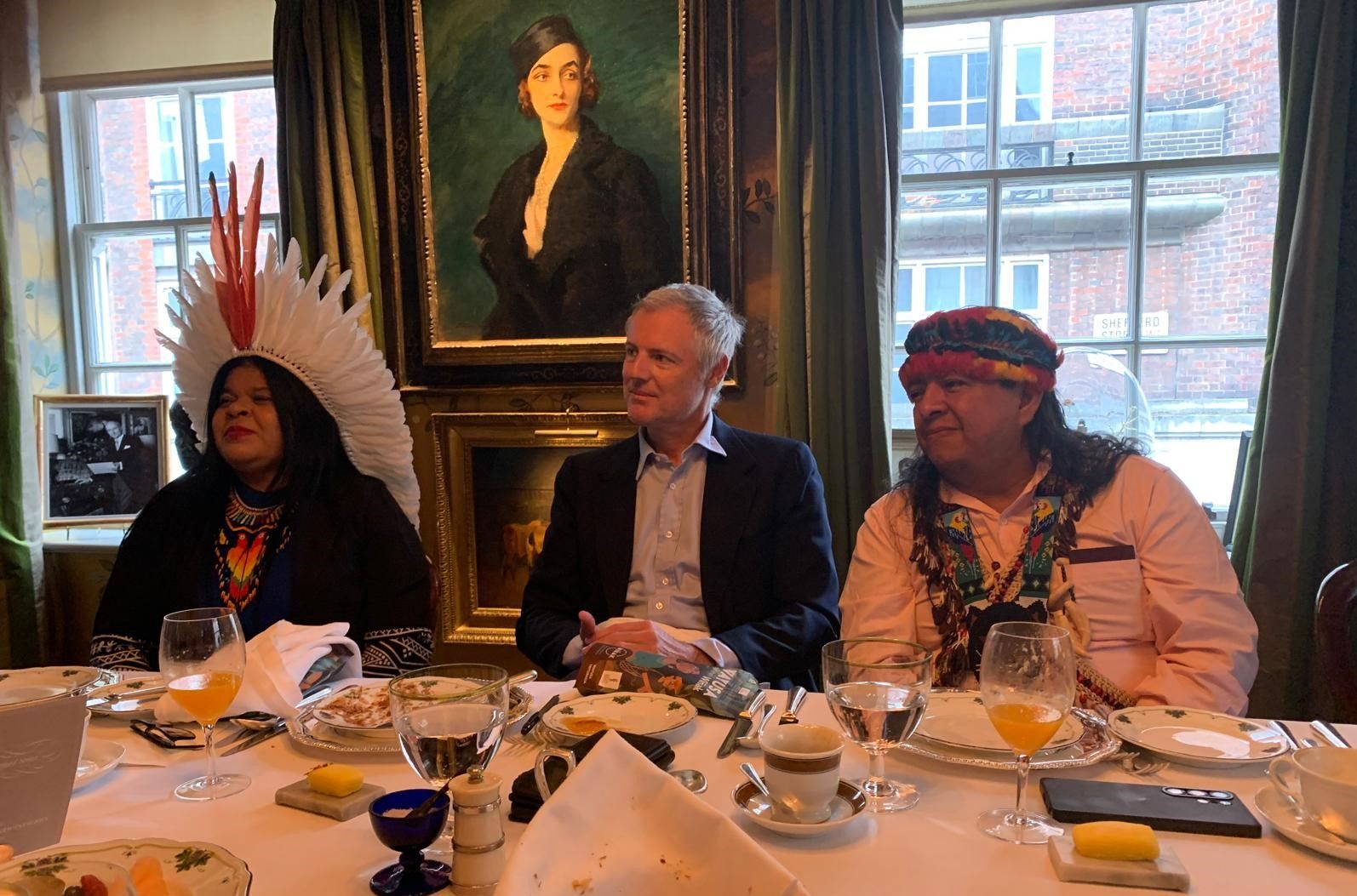
Land tenure and Indigenous economy could also easily be featured as keywords from last week. Foundation for Farmers Organisations and Restorative Action (FFORA) convened a discussion hosted by Lord Zac Goldsmith, Senior Fellow at the Bezos Earth Fund, inviting a select group of organisations, including BTeam, Nature4Climate, Tenure Facility, and ICPHub, to explore and accelerate the design and development of an Indigenous-led Chamber of Commerce. At the table were Sonia Guajajara, Minister for Indigenous Peoples in Brazil, and Juan Carlos Jintiach, Executive Secretary of the Global Alliance of Territorial Communities. They discussed why Indigenous-designed and -led economies are key for nature, climate, and livelihoods—and how COP30 could be a breakthrough moment for the indigenous economy, where initiatives like direct financing and chambers of commerce could exponentially accelerate action and drive local enterprises, trade, and IP&LC access to wider markets. Photo: FFORA
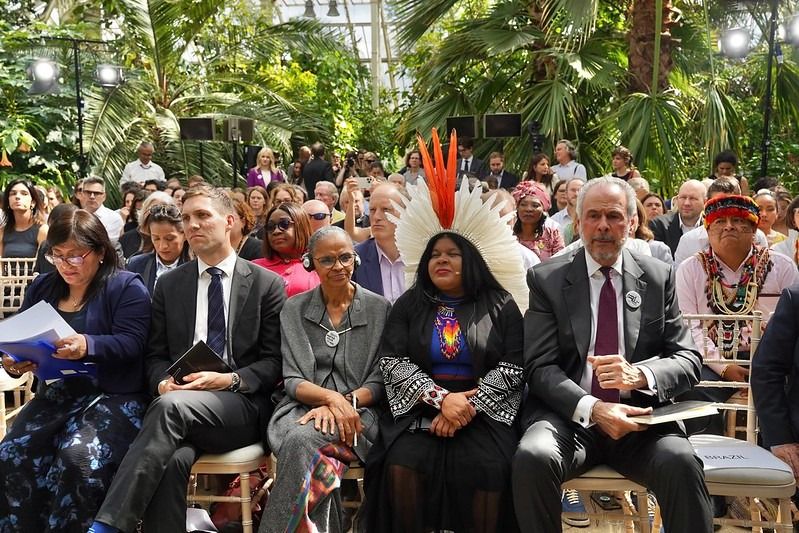
Another important advancement on the IP&LC front was the announcement that seven governments—Brazil, Colombia, Germany, Ghana, Norway, Peru, and the UK—have joined over 20 philanthropic and Indigenous organizations, including the Bezos Earth Fund, the David and Lucile Packard Foundation, and the Ford Foundation, to call for bold commitments at COP30. Priorities include supporting an Intergovernmental Land Tenure Commitment, renewing the Land and Forest Tenure Pledge, and shaping the Tropical Forest Forever Facility (TFFF) repasses for Indigenous peoples. These commitments build on the $1.7 billion pledge to IP&LC finance made at COP26 in Glasgow, where 140 governments also committed to halting and reversing forest loss and land degradation by 2030. Photo: FCLP
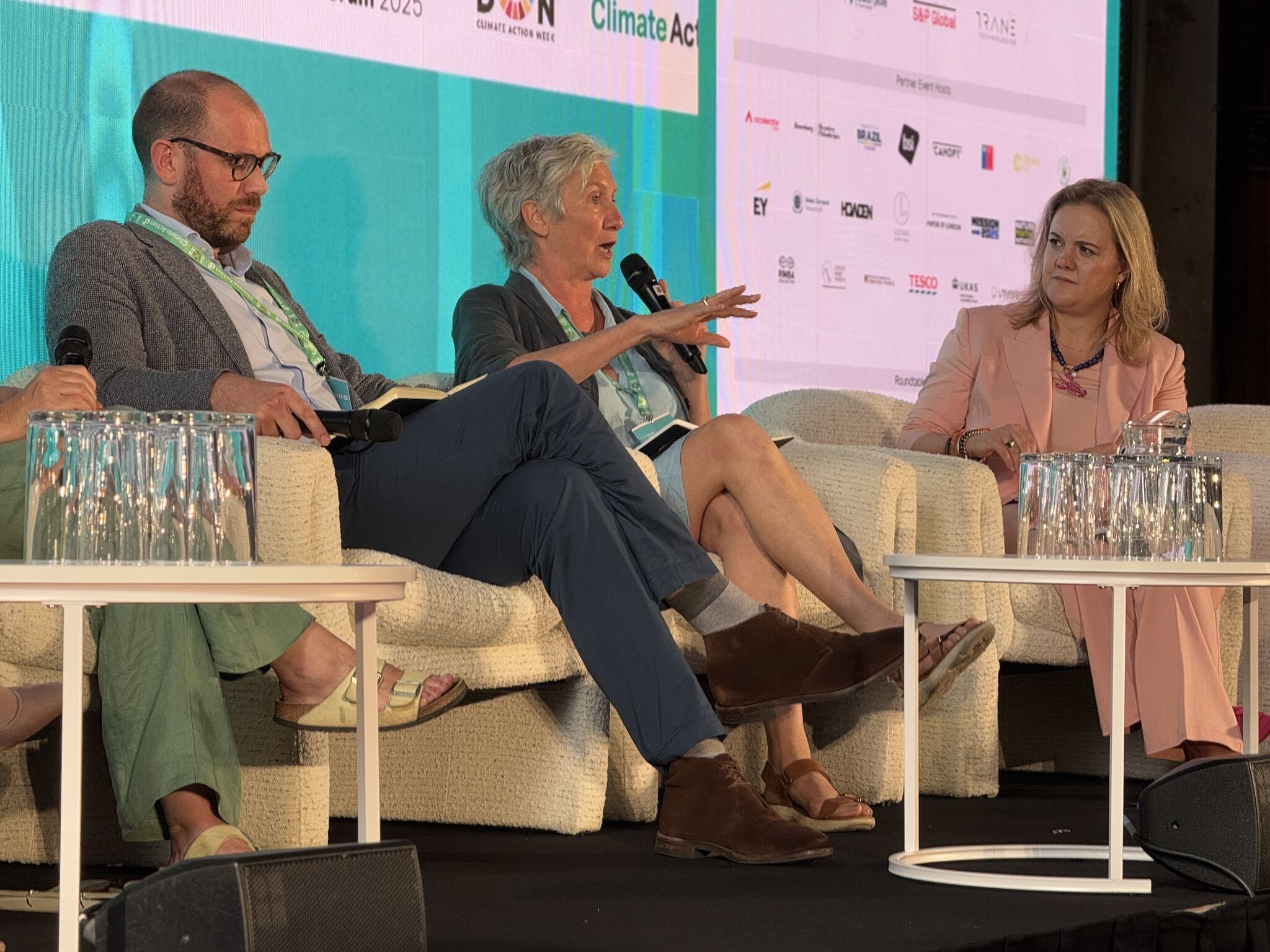
Across stages and sectors, one message echoed: we need to do it all, and we need to do it now. “Emissions reductions cannot be achieved without deploying nature,” said Clare Shakya, Global Managing Director of Climate at The Nature Conservancy, at the Climate Innovation Forum. “If we wait for other solutions, they won’t come online fast enough. Nature is also the cheapest and most flexible tool for adapting to the climate impacts we’re already facing.” Photo: The Nature Conservancy
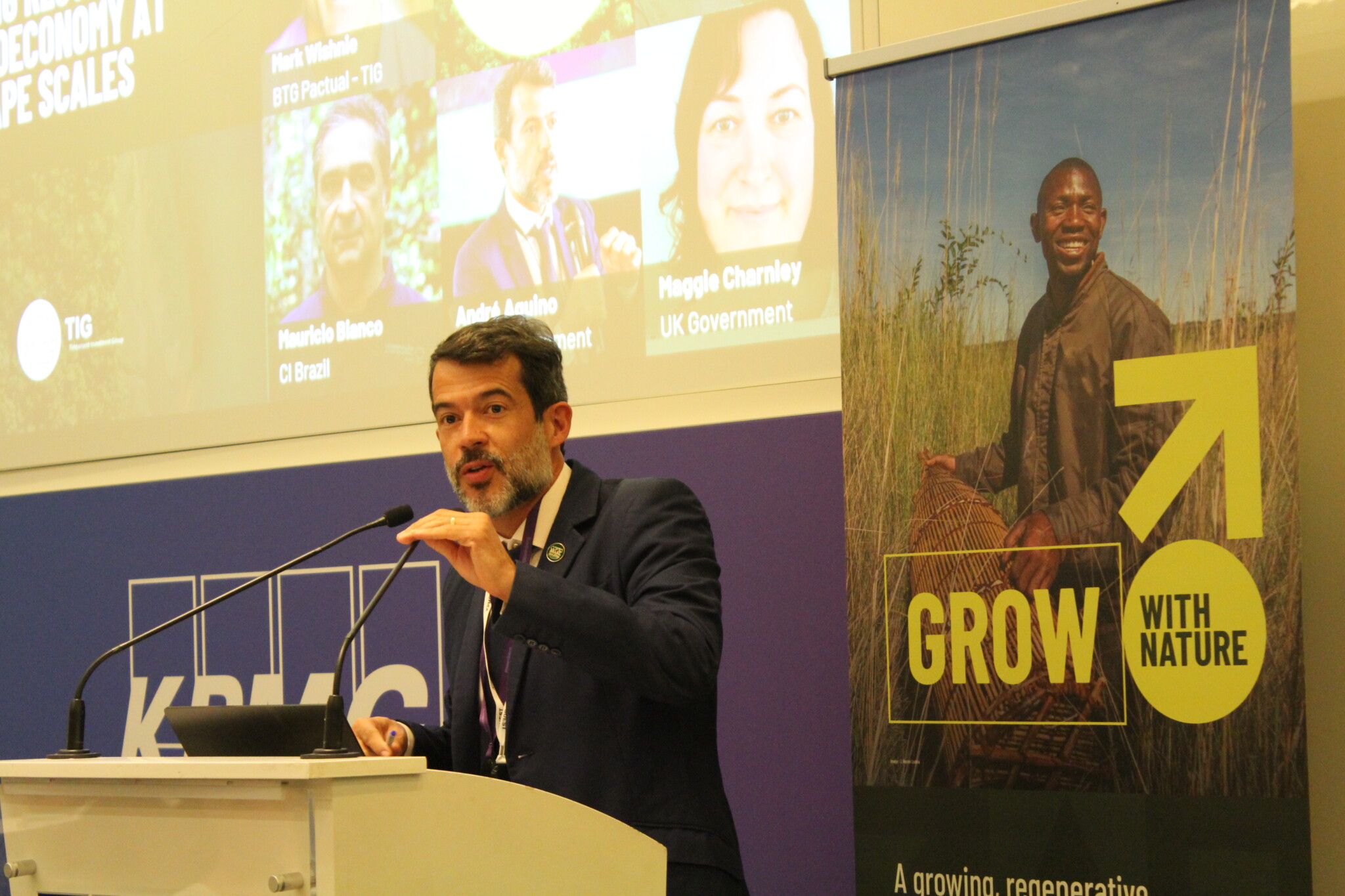
André Aquino, Head of the Special Advisory on Economy and Environment at Brazil’s Ministry of Environment and Climate Change, joined multiple events defending the additional and complementary role of the TFFF proposal alongside mechanisms already in place—like voluntary carbon markets—to speed up urgent forest finance. “It shouldn’t be a philosophical discussion. We need all of them, and we need them quickly. We need mechanisms that governments can understand and that show they are taking action.”
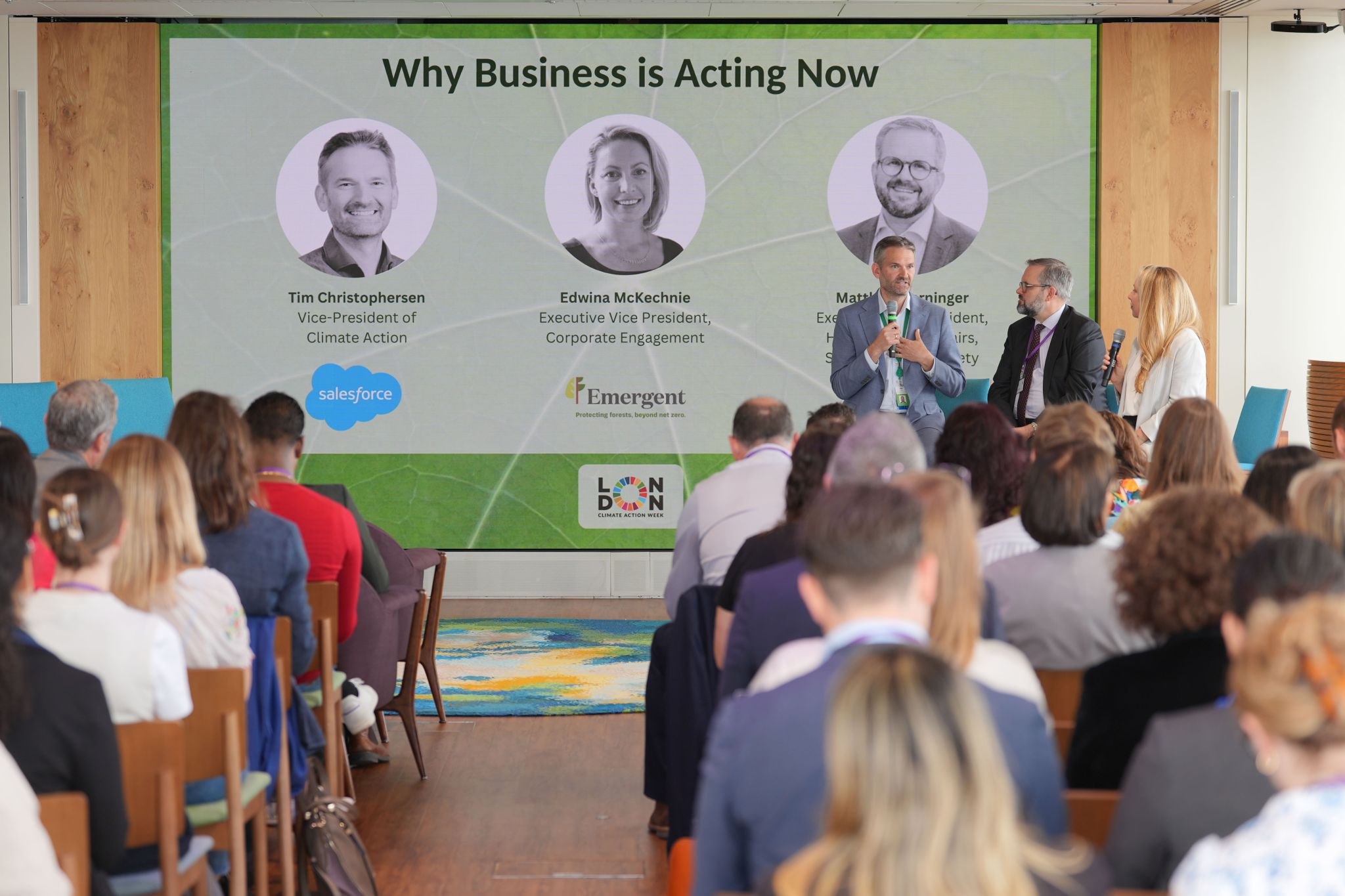
At the Salesforce Tower, its Climate Action Vice President, Tim Christophersen, said AI is transforming all the areas they aim to work in and invest in, particularly land use and smallholder farming. He also emphasized how Salesforce views nature as key infrastructure for its operations, citing water for cooling data centers as an example. “Investing in mechanisms to finance nature is not a matter of ‘either/or.’ We need to do it all, and we need to do it right now. Companies willing to invest can learn from coalitions already on this journey. You can start small, but start now.” Photo: Emergent
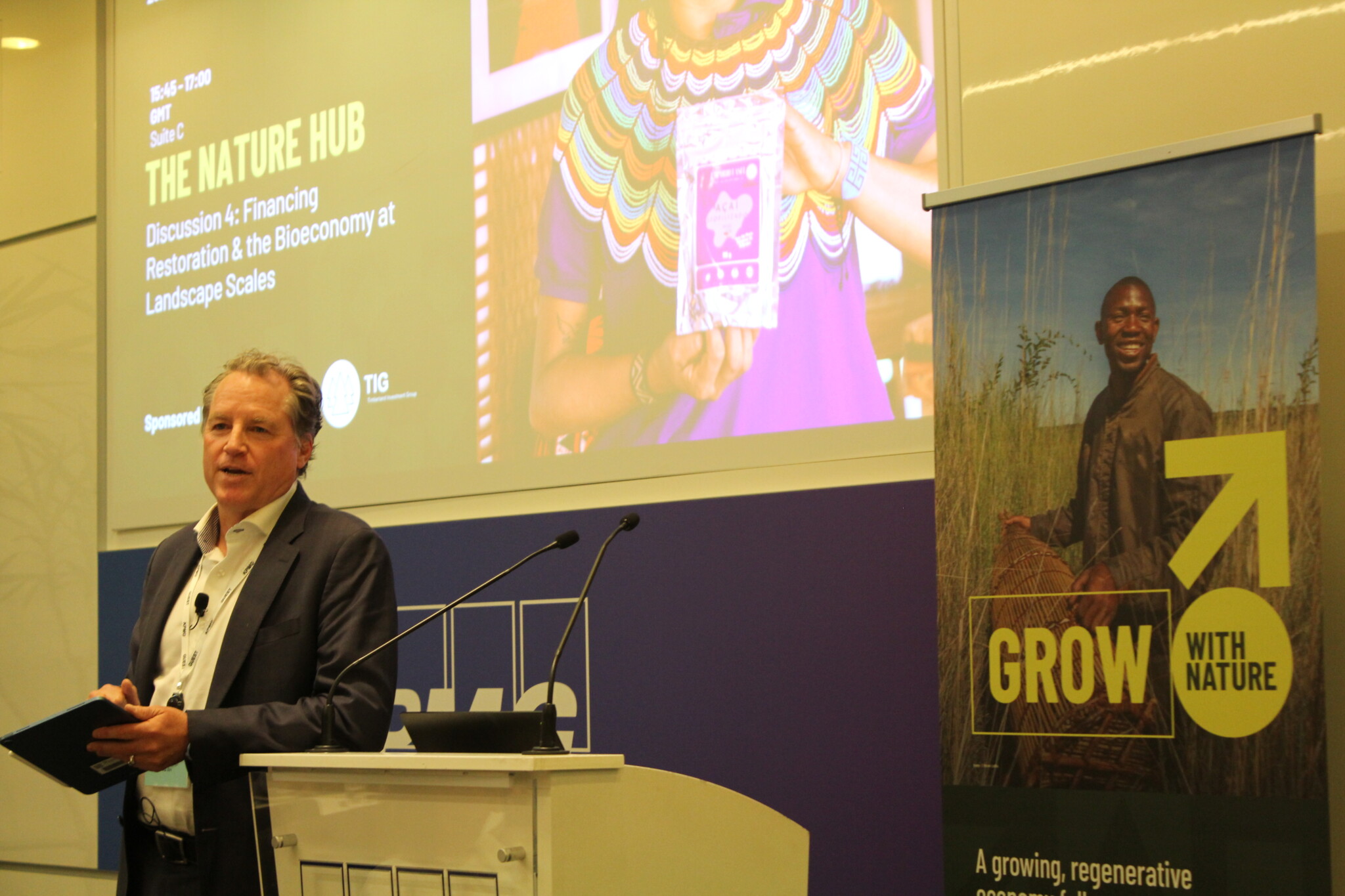
“‘Let’s be smart about it,’” said Jack Hurd, Executive Director of the Tropical Forest Alliance, also addressing the need to bring policymakers on board. “Politicians will always look at this through the lens of economic growth, livelihood creation, and human well-being. These are the topics to start and finish the conversation with—not anything else. So let’s be smart about how we talk about climate and nature action, hooking it all together.”
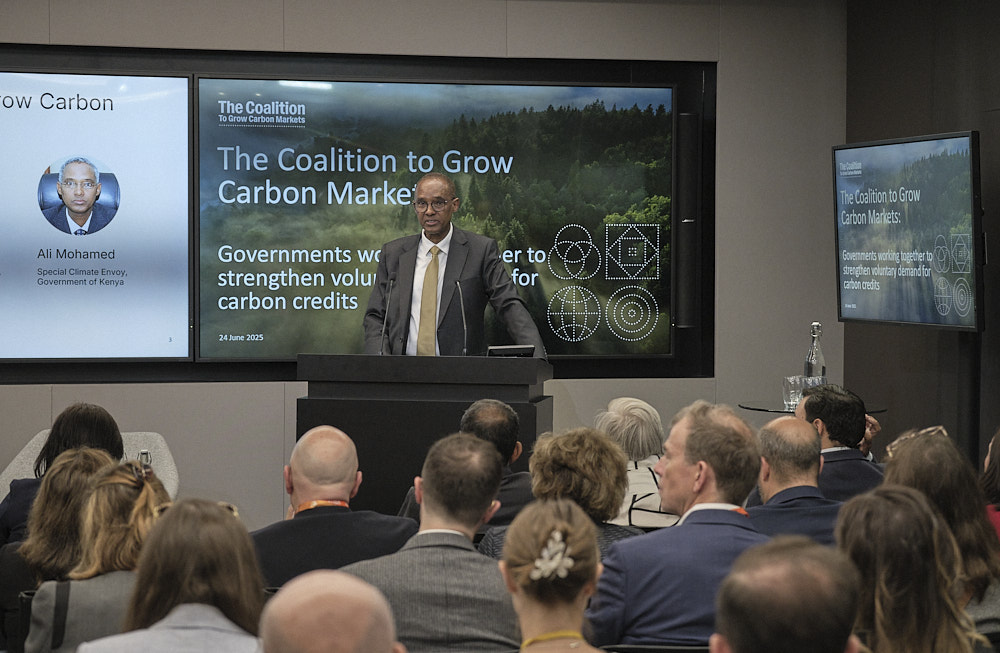
Kenya, Singapore, and the UK announced a new coalition to boost demand for high-integrity carbon credits. The initiative aims to restore private sector confidence and unlock up to $250 billion in climate finance by 2050, particularly for transformative projects in developing countries. “By boosting demand for high-integrity credits, the market could expand to as much as $250 billion by 2050 in direct and leveraged finance, supporting global climate action, particularly through transformative projects in developing countries.” said Ali Mohamed, Kenya Special Climate Envoy and Co-Chair of the Coalition to Grow Carbon Markets. Photo: James Winspear/VCMI
The Agri reconciliation
Responsible for nearly 90% of tropical deforestation and a third of global emissions, food systems receive less than 5% of climate finance. A COP in Brazil—one of the world’s major food producers—is a key opportunity to bring agriculture into climate discussions and promote a long-overdue reconciliation between nature and production. LCAW helped consolidate this message, with multiple events reinforcing the link. One standout was the launch of the Catalytic Capital for the Agriculture Transition (CCAT), which aims to raise $200 million by COP30 and leverage $800 million in private finance. The fund targets soy, cattle, agroforestry, and non-timber forest products, with support delivered directly at the farm level.
A growing trend is the push to reframe agriculture as central to climate solutions, with Brazil presenting a major market opportunity for halting even legal deforestation.
“Sustainability is not a cost but a survival imperative. Collective and concerted effort is the only way forward.”
Minister-Counselor Felipe Bandeira de Mello, Deputy Chief of Mission at the Embassy of Brazil in the United Kingdom.
Brazil’s Special Envoy for Agriculture to COP30, Roberto Rodrigues, used LCAW to host the Brazilian Agritech Briefing and deliver a letter to the COP30 Presidency. It outlined Strategic Success Indicators for Tropical Agriculture at COP30, emphasizing tropical agriculture’s critical role in food, energy, and climate security, as well as economic development.
The indicators also call for a diplomatic shift away from the fragmented perspective that separates agriculture, forests, and climate, toward an integrated land-use approach—combining native vegetation conservation and restoration, food systems, renewable energy, bioeconomy, mitigation, and adaptation. Another indicator calls for advancements in climate finance commitments for sustainable agriculture, including support for innovative financial instruments such as compensation for avoided deforestation and pastureland regeneration, and the expansion of financial support mechanisms for productive native forests and agroforestry systems beyond REDD+.
At the event, the Brazilian delegation also announced a $6 million expansion of the Responsible Commodities Facility, mobilizing finance from multiple stakeholders such as Rabobank, IDB, and the UK Government. The main focus is to offer low-interest rates, primarily to soy producers committed to the zero-deforestation goal.
Investor Sentiment on Nature – A new global survey by Pollination reveals that 96% of nature-focused investors say the politicization of ESG is influencing their strategies. Despite this, nearly all 500 respondents across the UK, USA, Australia, Singapore, and Japan plan to increase nature-related investments. Pollination CEO Martijn Wilder emphasized that nature is evolving from a risk factor to a strategic growth driver, underpinning supply chains and long-term value creation.
Nature Guidebook for Business – The World Resources Institute (WRI) introduced “A Guidebook for Businesses on Nature” at the Nature Hub. Developed with input from 41 companies, including Holcim, Walmart, and Salesforce, the guide features the ARK and SPARK frameworks and real-world case studies to support nature strategy implementation.
UK Businesses Back Nature-Positive Pathways – 28 UK organizations—including Aviva, Barclays, Sainsbury’s, and Sodexo—have endorsed the development of Nature-Positive Transition Pathways (NPPs). Led by GFI and WWF-UK, the initiative aims to provide science-based roadmaps for private sector contributions to UK nature targets, mirroring the success of Net Zero pathways.
NZAOA Issues Deforestation Guidelines – The $9.5 trillion Net-Zero Asset Owner Alliance released new guidelines to halt deforestation. The recommendations target companies, policymakers, and data providers, calling for deforestation-free supply chains, mandatory reporting, and improved data transparency.
Report on Biodiversity Finance – UNEP launched last week a new report exploring how governments can mobilize private finance to support National Biodiversity Strategies and Action Plans (NBSAPs). It outlines options for aligning financial flows with biodiversity goals and scaling private sector engagement.
New Economy Playbook – Mission 2025 released a roadmap to accelerate cost competitiveness for 60% of climate solutions. The Playbook outlines actions to scale clean industry ($1.6T by 2030), unlock nature finance ($542B annually), and deliver $1.3T annually in climate finance for developing countries. It supports the COP30 Presidency’s call to elevate private sector solutions.
Report on Nature-Related Financial Risks – A new report by Global Canopy, TNFD, and the University of Oxford confirms that nature-related risks are financially material. It links human-driven nature loss—such as deforestation and water pollution—to economic impacts like droughts, floods, and disease outbreaks.
Coalition to Grow Carbon Markets Launched – Kenya, Singapore, and the UK announced a new coalition to boost demand for high-integrity carbon credits. The initiative aims to restore private sector confidence and unlock up to $250 billion in climate finance by 2050, particularly for transformative projects in developing countries. “By boosting demand for high-integrity credits, the market could expand to as much as $250 billion by 2050 in direct and leveraged finance, supporting global climate action, particularly through transformative projects in developing countries,” said Ali Mohamed, Kenya Special Climate Envoy and Co-Chair of the Coalition to Grow Carbon Markets.
ICVCM and SHIFT CM Announce Strategic Partnership – The Integrity Council for Voluntary Carbon Markets (ICVCM) and SHIFT CM are finalizing a collaborative agreement to guide joint work through 2026. ICVCM, which sets global quality standards for carbon credits, will collaborate with SHIFT CM—an initiative led by The Nature Conservancy and Yale University—to address scientific gaps in carbon accounting. The partnership will support ICVCM’s Continuous Improvement Work Programs and help SHIFT CM align its research with market needs, including leakage quantification, reversal risk, and digital MRV.
Belém Investor Statement on Rainforests – Rainforest Foundation Norway, Global Canopy, AIGCC, and Ceres launched the Belém Investor Statement, urging alignment of capital with thriving tropical ecosystems and the Paris Agreement. The statement calls for clear policy signals, enforceable laws, and international cooperation.
Forestry Sector to Quantify Ecosystem Services – Ten leading forestry companies across 21 countries have committed to valuing ecosystem services to build an investible market. The 18-month initiative is led by the International Sustainable Forestry Coalition, with support from Value Australia and the Taskforce on Nature Related Financial Disclosures (TNFD).
Global Call for COP30 IP&LC Commitments – Seven governments—Brazil, Colombia, Germany, Ghana, Norway, Peru, and the UK—joined over 20 philanthropic and Indigenous organizations to call for bold commitments at COP30 for IP&LCs. Priorities include strengthening land tenure, renewing the Land and Forest Tenure Pledge, and shaping the Tropical Forest Forever Facility direct payments.
UK to Host IPBES12 in 2026 – UK Minister Mary Creagh announced that Manchester will host the twelfth Plenary of the Intergovernmental Science-Policy Platform on Biodiversity and Ecosystem Services (IPBES12) in February 2026. The event will unveil the landmark Business and Biodiversity Assessment, equipping companies with tools to measure and act on biodiversity impacts. A year-long programme, supported by institutions such as Kew Gardens and the Zoological Society of London, will engage global businesses. The UK is also seeking matched financial commitments to its £1 million pledge to build a platform uniting private sector leadership with public action.
